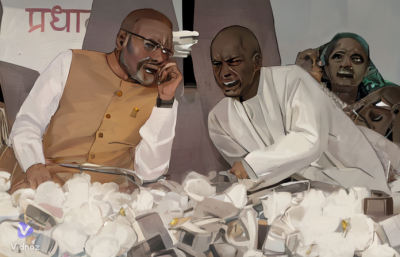By Syed Atiq ul Hassan, Sydney Australia

Post election results, Prime Minister Narendra Modi’s influence and policies have come under intense scrutiny, both domestically and internationally. Despite the Bhartiya Janata Party (BJP) winning a majority in the last two national elections, Modi’s ten-year tenure has been marked by actions aimed at transforming India into a Hindu state, deviating from the secular principles enshrined in the Indian Constitution. The global media has documented instances of discrimination and violence against minorities, especially Muslims and Christians, during Modi’s tenure as an Indian Prime Minister.
Modi’s controversial past, including the 2002’s massacre of Muslims when Modi was the Chief Minister of the state of Gujarat. The world has not been forgotten Gujarat riots and had already raised international concerns before he became the first time Prime Minister in 2014. However, major global powers largely remained silent, even as BJP and Rastriya Swayamsevak Sangh (RSS) extremists continued their Hindutva mission abroad, allegedly involving Indian intelligence in targeting their opponents. Recent incidents in Canada and Australia have further alarmed the international community, although Modi’s promises and rhetoric have often placated foreign governments.
raised international concerns before he became the first time Prime Minister in 2014. However, major global powers largely remained silent, even as BJP and Rastriya Swayamsevak Sangh (RSS) extremists continued their Hindutva mission abroad, allegedly involving Indian intelligence in targeting their opponents. Recent incidents in Canada and Australia have further alarmed the international community, although Modi’s promises and rhetoric have often placated foreign governments.
In Australia, Modi sought to strengthen economic and defence ties, suggesting that India could replace China’s role as Australia’s primary partner. This led to significant defence agreements with Japan, the United Kingdom, and the United States, positioning India as a counterbalance to China. Australian Prime Minister Anthony Albanese’s historic visit to India resulted in several landmark agreements. However, Australian intelligence reported that Modi’s government was using the Indian intelligence agency RAW to eliminate BJP and RSS opponents abroad, including Australia. The current visit of Chinese Premier Li Qiang to Australia, coming soon after the Indian election results, suggests that both Australia and China are looking to renew their longstanding friendship. This may indicate a realization within Australian circles about the potential overstatements of Indian claims and promises to stronger nations regarding their stance against China.
As Modi’s government faced growing scrutiny, powerful nations like Australia, USA, UK, Japan, and Middle Eastern countries closely monitored the Indian elections. The results revealed that the BJP failed to secure a two-thirds majority, losing significant seats even in strongholds like Uttar Pradesh. Surprisingly BJP lost the seat from Ayodhya where BJP built Ram Mundir by demolishing Babri Mosque.
This indicated that majority of Indians preferred to maintain the secular character of India. Consequently, Modi had to form a coalition with parties that attract Muslim votes, revealing a complex political landscape.
Following the election results, global reactions have intensified. Australian media and political representatives have started to speak out, characterizing Modi as a bigoted Hindu nationalist responsible for severe human rights abuses against minorities. Australia’s largest media network, through its Four Corners program, aired a report exposing BJP and RSS activities in Australia. The report accused Modi’s government of political interference and targeting overseas opponents. Avani Dias, a former South Asia Correspondent for Four Corners, revealed that RSS cells have been established in Australia, and Indian authorities have threatened Indian Australians critical of the BJP with visa denials and other reprisals.
Similar reports have emerged from Canada, where Hardeep Singh Najjar, a 45-year-old Sikh leader, was killed last June (2023). These incidents underscore the international concerns about Modi’s policies and actions.
Observers believe that the recent election results demonstrate the Indian electorate’s political maturity, rejecting the BJP’s extreme Hindutva agenda. In a diverse nation like India, home to various religions, ethnicities, and cultures, maintaining a secular country that ensures justice, equality, and human rights for all citizens is crucial for national unity and survival.
The implications of these election results extend beyond India’s borders. Countries that had entered into strategic agreements with India, seeing it as a counterbalance to China, are now reevaluating their positions. The Modi administration’s promises of economic cooperation and defence partnerships had painted India as a reliable ally. However, the revelations of political interference and extraterritorial operations have raised questions about the reliability and ethical stance of Modi’s government.
The reaction within India has been mixed. Supporters of Modi argue that his policies are necessary to uphold India’s cultural heritage and national security. They claim that the international criticism is an orchestrated effort to undermine India’s sovereignty. On the other hand, critics argue that Modi’s brand of nationalism is exclusionary and undermines the very fabric of Indian democracy. They highlight that India’s strength lies in its diversity and secularism; principles that have been compromised under Modi’s rule.
The economic implications of the election results are also significant. With the BJP failing to secure a decisive majority, political instability could impact investor confidence and economic growth. The need to form a coalition government may lead to policy compromises and slower implementation of reforms. This uncertainty could affect India’s ambitious infrastructure projects and its goal of becoming a $5 trillion economy by 2025.
Internationally, the narrative surrounding Modi’s leadership is shifting. Where he was once seen as a transformative leader capable of driving India’s economic growth, he is now viewed with increasing scepticism. The allegations of political interference and human rights abuses are damaging India’s image on the global stage. Countries that once saw Modi as a key ally in their strategic calculations are now reassessing their diplomatic ties.
The impact of media reports, like those from Australia’s Four Corners, cannot be understated. These reports bring to light the darker aspects of Modi’s administration, challenging the narrative of progress and development that has been a cornerstone of his public image. The testimonies of Indian Australians facing threats from Indian authorities further complicate the situation, showing that the reach of Modi’s policies extends far beyond India’s borders.
In conclusion, the recent election results have revealed deep fissures in India’s political landscape and exposed the limitations of Modi’s leadership. The BJP’s failure to secure a decisive mandate is a clear indication that many Indians are wary of the party’s Hindutva agenda. For India to maintain its global standing and ensure internal harmony, it must reaffirm its commitment to secularism and democracy. The international community, too, must hold India accountable to these principles, ensuring that strategic partnerships do not come at the cost of human rights and democratic values. The coming years will be crucial in determining whether India can navigate these challenges and emerge as a truly inclusive and democratic nation. (The writer, Syed Atiq ul Hassa, is a Sydney-based journalist, analyst, and writer. He is also the editor, Tribune International, Australia. His email is shassan@tribune-intl.com ).




